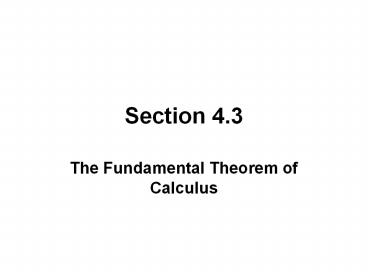The Fundamental Theorem of Calculus
1 / 7
Title:
The Fundamental Theorem of Calculus
Description:
The Fundamental Theorem of Calculus ... Document presentation format: ... Times New Roman Arial Calibri Default Design Microsoft Equation 3.0 Section 4.3 A ... –
Number of Views:178
Avg rating:3.0/5.0
Title: The Fundamental Theorem of Calculus
1
Section 4.3
- The Fundamental Theorem of Calculus
2
A FUNCTION DEFINED BY A DEFINITE INTEGRAL
The first part of the Fundamental Theorem of
Calculus deals with functions defined by a
definite integral. Let f (t) be a continuous
function defined on the interval a, b. If x
varies between a and b, we can define the
function g by The function g is sometimes called
an accumulation function since gives the area
accumulated so far.
3
THE FUNDAMENTAL THEOREM OF CALCULUS, PART 1(FTC1)
Theorem If f is continuous on a, b, then the
function g defined by is continuous on a, b
and differentiable on (a, b), and g'(x) f (x).
4
FTC1 IN LEIBNIZ NOTATION
Theorem If f is continuous on a, b, then the
function g defined by is continuous on a, b
and differentiable on (a, b), and
5
THE FUNDAMENTAL THEOREM OF CALCULUS, PART 2(FTC2)
Theorem If f is continuous on a, b,
then where F is any antiderivative of f, that
is, a function such that F ' f.
6
NOTATIONS FOR F(b) - F(a)
7
THE FUNDAMENTAL THEOREM OF CALCULUS
Theorem Suppose f is continuous on a,
b. 1. If , then
g'(x) f (x). 2.
, where F is any antiderivative of
f, that is, F ' f.































